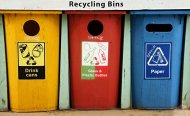Secondary Waste Treatment
 Credit: flickr.com/ epSos.de
Credit: flickr.com/ epSos.de
The President of the National Union of Self-Regulated Operators for Waste Management, Michael Vasilenko, was cited as a barrier to the operation of the garbage business.
According to the entrepreneur, the law did not solve the main problems of the recycling industry, did not reduce the pressure of the administrative resource on business and did not create the interest of the investor.
Instead, there has been increased government control of business, the return of licensing and the expansion of the list of licensing activities.
" The law left us eight years ago and will result in the final loss of the secondary industry " , declared Vasilenko.
Dumping is red light!
In developing urban waste management programmes, it has been accepted to refer to European experience, but to do so as abroad, where the processing industry, which began around 20 years ago, is rapidly developing and earning incomes until it is available.
As the Chairman of the NPP, Semen Gordyszewski, said, according to the European Commission ' s proposals, there are plans to increase the reuse of domestic waste to 70 per cent by 2030, the reuse of glass, paper and plastic packing to 80 per cent, and the ban on landfills of any recycled and biological waste by 2025. In Russia, we went differently.
The Petersburg Regional Task Programme on the Management of TCO, while aiming to improve environmental safety and reduce environmental damage in waste management, is in fact fully based on the introduction of waste incinerators.
In the meantime, waste incineration is a source of emissions of hazardous substances - dioxins, furans, biphenyls, which are accumulated in the environment and cause cancer and mutation.
If all burning fractions are used as fuel, it will inevitably lead to a deterioration in the health of the population, it is convinced by the Gordyshevsky. There are virtually no clean material among these fractions: even simple paper contaminated with paint is used in burning biphenyls.
In the view of the Environment, the Programme, which is currently under development, should include such tasks as reducing waste generation, developing separate collection, processing and recycling of waste with secondary resources - secondary, compost, biogas.
Related posts:
 In the Volgograd Region Administration, a concession agreement was signed on public utilities, recycling, disposal (storage) of solid household waste. According…
In the Volgograd Region Administration, a concession agreement was signed on public utilities, recycling, disposal (storage) of solid household waste. According… The building is already over, and a bunch of building debris and waste remains lying, rather than seriously ruining the type of capital. As a result, today the required…
The building is already over, and a bunch of building debris and waste remains lying, rather than seriously ruining the type of capital. As a result, today the required… I ve done a lot of franchise monitors, but I ve got the usual bids, a cafe or a store that s already starting to compete with me, I thought I was bored, telling…
I ve done a lot of franchise monitors, but I ve got the usual bids, a cafe or a store that s already starting to compete with me, I thought I was bored, telling… What are the rules for sorting debris on French Riviera? When we rented an apartment in Paris, there were a few large tanks in the interior courtyard where classic…
What are the rules for sorting debris on French Riviera? When we rented an apartment in Paris, there were a few large tanks in the interior courtyard where classic… Is discipline important in investing? Without any doubt it is true! A disciplined investor will never buy securities without serious analysis or pay attention to…
Is discipline important in investing? Without any doubt it is true! A disciplined investor will never buy securities without serious analysis or pay attention to… Structural debris: brick, brisket, concrete, stoves obtained during the dismantling of construction sites are transformed into a secondary building block on GOST…
Structural debris: brick, brisket, concrete, stoves obtained during the dismantling of construction sites are transformed into a secondary building block on GOST… Professional presentation demands more than just content - it requires the right display platform. The Black Easel stands out as a sophisticated solution for artists…
Professional presentation demands more than just content - it requires the right display platform. The Black Easel stands out as a sophisticated solution for artists… An incineration factory in the heart of Vienna is unique not only because it does not completely damage the environment, but it also, unlike its collars, decorates…
An incineration factory in the heart of Vienna is unique not only because it does not completely damage the environment, but it also, unlike its collars, decorates… The Territorial Waste Management Scheme was held by the Parliamentary Hearings at Medoldum Parliamentary hearings of the Regional Waste Management Scheme were held…
The Territorial Waste Management Scheme was held by the Parliamentary Hearings at Medoldum Parliamentary hearings of the Regional Waste Management Scheme were held… Environmentally sound behaviour is very often consistent with the principles of rationality, servitude, prudential treatment of purchases, by their time, to environmental…
Environmentally sound behaviour is very often consistent with the principles of rationality, servitude, prudential treatment of purchases, by their time, to environmental…